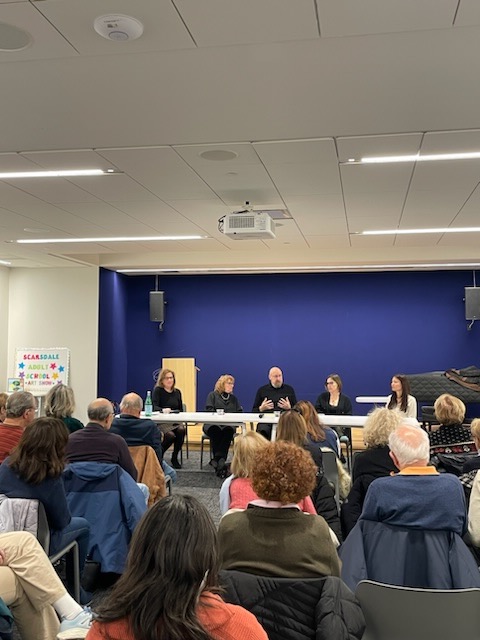A Panel on Anti-Semitism in Publishing at Scarsdale Library
- Monday, 20 January 2025 08:27
- Last Updated: Wednesday, 22 January 2025 17:10
- Published: Monday, 20 January 2025 08:27
- Andrea Seiden
- Hits: 1821
 The publishing industry is grappling with a troubling rise in anti-Semitism and anti-Israel sentiment, which is creating obstacles for Jewish authors and works with Jewish or Israeli themes. To address this pressing issue, Scarsdale Library hosted a panel discussion on January 10, 2025, titled “This Moment in Time: A Panel on Anti-Semitism and Publishing. "
The publishing industry is grappling with a troubling rise in anti-Semitism and anti-Israel sentiment, which is creating obstacles for Jewish authors and works with Jewish or Israeli themes. To address this pressing issue, Scarsdale Library hosted a panel discussion on January 10, 2025, titled “This Moment in Time: A Panel on Anti-Semitism and Publishing. "
The event, moderated by Scarsdale author Barbara Josselsohn (The Forgotten Italian Restaurant) and Frederic Price, founder of Fig Tree Books LLC, moderated a panel of notable writers. Jacqueline Friedland (He Gets That From Me), Haya Molnar (Under a Red Sky), and Samantha Greene Woodruff (The Lobotomist’s Wife) each shared their insights on the challenges they face as Jewish writers.
Frederic Price highlighted an alarming trend: publishers and agents increasingly avoid representing Jewish authors or works perceived as “too Jewish.” He attributed this shift partly to younger, left-leaning woke employees at publishing houses who dismissed works based on subject matter or the author’s name.
Jacqueline Friedland shared her encounter with a Google spreadsheet titled “Is Your Favorite Author a Zionist?” This widely shared document categorized authors based on their stance on Israel, encouraging users to boycott books by pro-Israel writers. Garnering over one million views, the spreadsheet is a grim reminder of how social media fuels intolerance, particularly in the wake of the Hamas attacks on October 7. Friedland also noted that anti-Zionist readers have intentionally undermined books on social media sites like Goodreads by leaving poor reviews and low ratings, effectively tanking their success.
This environment has led to calls for boycotts of Israeli cultural institutions. Over 1,000 authors, including Sally Rooney and Percival Everett, signed a letter accusing such institutions of complicity in alleged human rights violations. However, there is some pushback. Another coalition of literary professionals signed a letter rejecting these boycotts, arguing that such measures stifle cultural exchange and free expression.
Ironically, panel members shared that they are writing increasingly as proud Jews, refusing to hide or shy away from detractors or topics that can invoke controversy. The panelists offered hope and advice to Jewish writers. “Stay true to your creative voice,” urged Haya Molnar. Frederic Price agreed, emphasizing, “Don’t change a thing.”
The panel also discussed a movement in the literary world regarding whether writers should or should not explore "other voices"—that is, writing about experiences, cultures, or identities that differ from their own. Increasingly, writers are criticized for lack of authenticity and cultural appropriation. In fact, Price shared that some publishing houses employ sensitivity readers to review manuscripts.
Not surprisingly, social media has amplified these criticisms. Some new writers have faced public backlash, boycotts, or even withdrawn books after being accused of cultural appropriation or misrepresentation.
The panel took great offense to these allegations and felt that such unfounded, impractical criticism impeded their storytelling ability. The panel is committed to respectful creativity, and a panel member quoted Maya Angelou’s advice to writers, "I think you need to live in as many different characters’ shoes as possible in your writing. That is to say, be empathic and compassionate, and enter those experiences to the best of your ability. You can never fully know another’s experience, but you can try to understand and portray it honestly."
This is a sad state of affairs with censorship and a lack of freedom of speech emerging in ways many have not witnessed in their lifetimes. Price went on to say we need to move from outrage to action. He encouraged writers to explore alternative publishing avenues, like the Jewish Publication Society, to ensure their stories reach readers. He hopes that some prominent non-Jewish people will have the courage to speak out against this censorship. Readers also play a role and should continue vigilance and speaking up. When asked, some panelists would refuse to read specific authors given their criticism of Israel, like Sally Rooney (Normal People) or Percival Everett (James).
The event concluded with attendees expressing gratitude for the Scarsdale Library’s commitment to fostering dialogue on critical issues. By spotlighting the challenges of Jewish the panel discussion sparked a meaningful conversation about the broader implications of free expression and cultural tolerance. Events like these remind us of the power of discussion to inspire understanding and action.
Commenting on the event, Barbara Josselsohn said, "It was wonderful to see so many people join us on a cold January morning. The panelists all had such valuable insights, and the audience questions and observations were smart and thoughtful. I’m so grateful to the Scarsdale Library for hosting this important discussion.”






